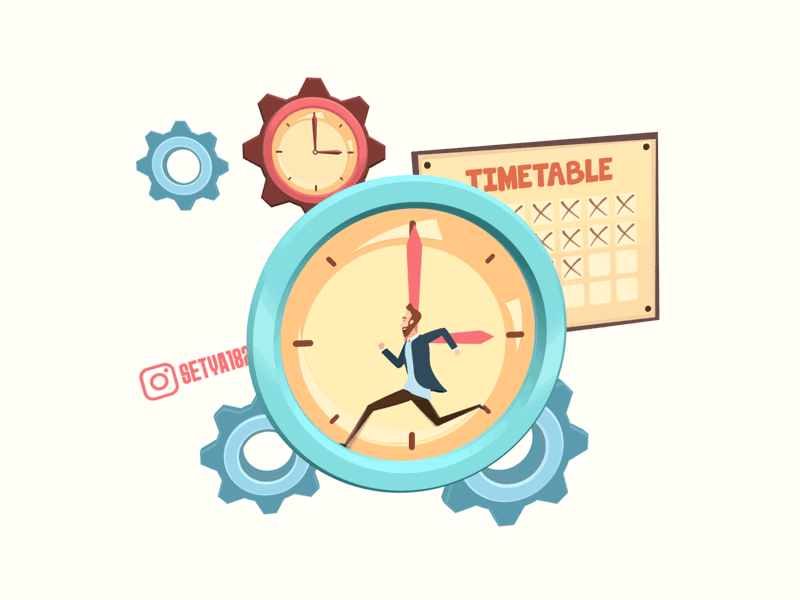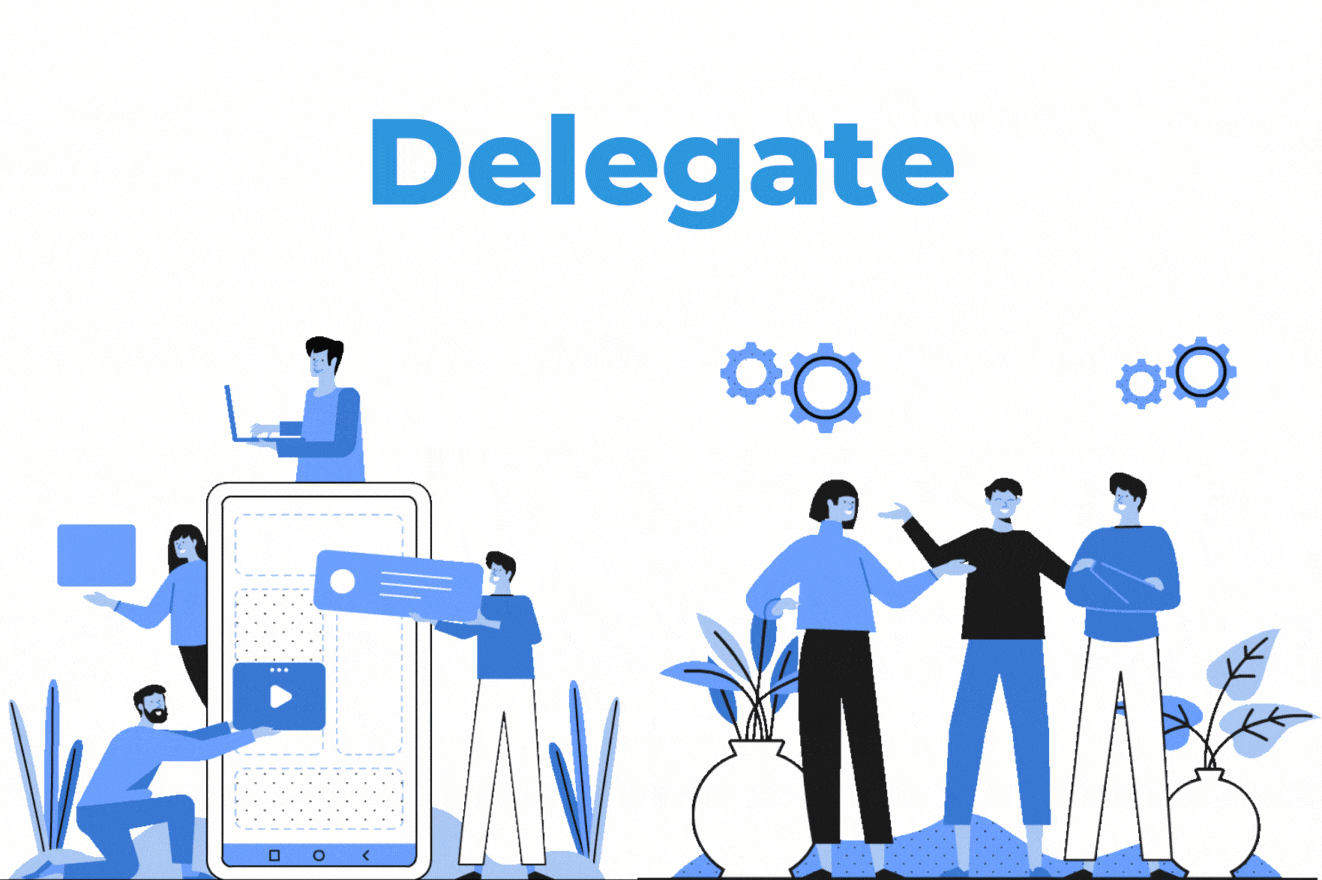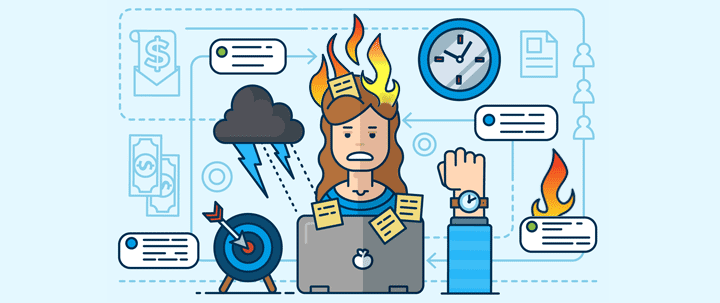
Photo by Bench Accounting on Unsplash
7 Effective Strategies to Handle Increased Workload as a Developer

Introduction
Welcome, dear reader, to the world of programming where workload and deadlines are as unpredictable as the weather! Recently, you might be feeling the surge of tasks and projects piling up at an alarming rate. If so, then congratulations because you're leading your way towards being an experienced developer! Now, you might be contemplating, "How the heck can I handle this?" Don't fret, dear fellow codester. This blog post is meant for you.
Overview of the topic
In this post, we're going to delve deeper into the realm of "workload management tips", guiding you through a journey of harmonizing your code with your brain without actually burning it out. We don't want you to just cope with the rising tide of tasks, but to swim comfortably in it - all while maintaining a smile on your face. We'll cover "managing heavy workload as a developer" and "coping with increased work pressure" in a startup or any other company.
Importance of managing increased workload as a developer
Handling an increased workload effectively is an absolute necessity for every developer. It not only impacts your productivity but also your mental health, personal life, and the overall growth as a developer. Getting buried under a pile of tasks can cause stress and could result in burnout. Therefore, having a strategy for managing a heavy workload is crucial. Follow along, my friend, as we unveil seven effective strategies to handle your workload like a pro!
Understanding the Increased Workload

It's first essential to understand the term 'increased workload.' Essentially, it's a hefty volume of tasks or projects that require more energy or time than what you're typically used to. But how did we land here?
Factors Contributing to Increased Workload
Various factors can trigger an increased workload. A sudden scale up in project size, tighter deadlines, and unexpected technological challenges can all increase the volume of your workload. Furthermore, if you're part of a startup or a small company, new business development efforts and growth goals can also contribute significantly. Let's put these in bullet points:
- Scale-up in project size or complexity.
- Tighter deadlines and project schedules.
- Technological challenges or adoption of new technology.
- Business development and growth in startups or small companies.
Impact on Developer Productivity and Well-being

While some added pressure can stimulate productivity, an excess workload often results in stress, decreased job satisfaction, and reduced quality of work. Furthermore, continuously working under high pressure without adequate breaks could lead to burnouts. These factors adversely impact not just your productivity levels but also your overall well-being. Ultimately, managing your workload effectively is key to maintaining balance and staying efficient in your role.
In the next section, we'll explore some proven strategies for managing increased workload as a developer.
Prioritizing Tasks
.png)
Effectively dealing with a soaring workload becomes much simpler when you learn to prioritize. Prioritizing is all about finding out what tasks require your immediate attention and which ones can wait a bit. This way, you will be focusing your energy and skills where they are much needed.
Importance of Task Prioritization
The purpose behind prioritizing tasks is to ensure that you're spending your time where it gives the most results. It's important because:
• It allows you to focus on higher-value tasks first.
• It helps you decrease stress as it eliminates the burden of "I have too much work".
• In the long run, it boosts your productivity.
• It improves your time management skills and helps you maintain work-life balance.
Methods for Prioritizing Tasks Effectively
When it comes to methods for prioritizing tasks, there are countless techniques:
• Eisenhower Matrix: This matrix categorizes tasks into urgent-important, important-not urgent, urgent-not important, not important-not urgent.
• ABCDE Method: In this method, A tasks are most important, B tasks are important, C tasks are nice to complete but aren't urgent, D tasks can be delegated, and E tasks can be eliminated.
• Ivy Lee Method: At the end of each workday, write down six most important tasks to accomplish the next day, order them in their true priority, and work on them one at a time.
Prioritization is an ongoing task. As a developer, re-evaluate your task list regularly to ensure it aligns with your goals and responsibilities.
Time Management Techniques

Working under pressure with an increased workload can be challenging. This is where efficient time management becomes a game-changer. Let’s delve deeper into the aspects of time management and how it can help handle a heavy workload.
Importance of Time Management for Handling Increased Workload

Time management is a crucial skill for a developer, especially when workload increases. It not only helps you keep track of tasks but also sharpens your focus, boosts productivity, and decreases stress. Specific advantages include:
• Completing tasks within deadlines.
• Ensuring quality in your work.
• Reducing burnout and maintaining a healthy work-life balance.
Time management is your key to creating an efficient work environment even when the pressure is on an upward incline.
Time Management Strategies for Developers

Reducing the impact of added workload isn’t as daunting if you have the right time management strategies in place. Some of these strategies include:
• Prioritizing tasks: Not all tasks have the same urgency or importance. Start prioritizing tasks based on their impact on your projects.
• Using tools: There are several tools and tech that can automate processes and help with time management. For instance, task management software, code generators, or automated testing tools.
• Setting specific time blocks: Allocate specific time slots for certain tasks and stick to them. This is also known as the time blocking technique and can remarkably boost productivity.
These strategies aim to maximize productivity and manage time effectively, making it easier for developers to handle a heavier workload.
Delegating Tasks

Delegating tasks can be a solution when it feels like your workload is getting unmanageable. As a developer, you need to get into the habit of sharing some tasks with your fellow team members to get things done quickly, efficiently, and without compromising your mental health.
Benefits of Delegating Tasks

Delegating tasks is beneficial in more ways than you might think. It not only helps you to manage your time better but also gives you the opportunity to focus on tasks that need your expertise. Apart from this, it promotes team learning and skills development, which can prove helpful in the long run. Additionally, delegating:
- Enhances team trust, communication, and collaboration
- Gives scope for innovation by offering different perspectives
- Reduces your stress and prevents potential burnouts
- Enables you to meet deadlines without compromising on quality
How to Effectively Delegate Tasks as a Developer

For effective delegation, you first need to identify tasks that can be delegated. These might be tasks that are time-consuming yet straightforward, or tasks that you are not an expert at but a teammate might excel in. Once you’ve identified them, ensure you're conveying the task requirements clearly to avoid miscommunication.
Involving the team in task allocation can also encourage their acceptance and participation. Make sure to periodically provide constructive feedback to keep your team motivated and help them grow. Remember, effective delegation doesn't mean micromanaging but guiding your team towards success while handling the heavy workload that comes with being a developer in a startup company.
Setting Realistic Goals and Expectations

Handling tons of tasks with an increased workload can seem overbearing and stressful. But fear not! The first step out of this conundrum starts with setting realistic goals and expectations.
Importance of Setting Realistic Goals and Expectations
Often, the major trap many developers fall into is overestimating their workload capacity. When you set goals and expectations that are beyond your grasp, it becomes almost impossible to meet them, and this leads straight to excessive stress and a significant dip in productivity. Moreover, perpetually missing targets can also dampen your morale. Therefore, it's crucial to set goals that are not only worth your time but also achievable.
How to Set Achievable Goals as a Developer
Adopting the 'SMART' (Specific, Measurable, Attainable, Relevant, and Timely) goal system could be one way to ensure your goals are achievable. Here's how:
• Specific: Have clear and precise objectives
• Measurable: Include tangible criteria to measure your progress
• Attainable: Set objectives that are realistic and reachable
• Relevant: Align your goals with the company's objectives and tasks
• Timely: Include a time frame to keep you on track.
Remember, prioritizing, planning, and breaking down your tasks are crucial elements in relieving yourself of an intense workload. Set yourself up for success by being smart about your workload management.
Managing Stress and Avoiding Burnout

In the dynamic landscape of the tech world, the pressure to deliver on time and outshine competition can often lead to an increased workload for developers. As your list of task grows, it's important to apply effective strategies for managing stress and avoiding burnout.
Impact of Increased Workload on Stress Levels
An increased workload can cause a significant rise in stress levels for anyone, but especially for developers, who are often expected to handle multiple complex tasks simultaneously. As a developer, you're not only dealing with coding tasks but also keeping up with emerging technologies, meeting strict deadlines, and coping with the often-changing requirements of a project. This can lead to various adverse effects on your mental and physical health, such as anxiety, frustration, insomnia, and even burnout if left unchecked.
Tips for Managing Stress and Avoiding Burnout

1. Set Realistic Goals: Clearly outline what you can achieve within a specified time frame to easily manage your expectations and those of the team.
2. Prioritize Your Tasks: Identify the most crucial tasks and tackle them first. Use reliable project management tools to keep track of your tasks.
3. Take Regular Breaks: Remember, all work and no play makes for a stressed developer. Short, regular breaks can help rejuvenate your mind and increase productivity.
4. Keep Learning: Expand your skill set. This won't just make you more efficient but also helps to reduce the stress of facing unfamiliar tasks.
5. Practice Relaxation Techniques: Find what helps you relax, be it short meditation sessions, deep breathing exercises, or even a quick walk outdoors.
6. Seek Support: Don’t hesitate to seek help when required, reaching out to your colleagues or supervisor can quickly resolve problems and reduce potential stress.
Remember, managing workload is a continuous process and as a dedicated developer, you have the power to frame this in a way that works best for you.
Seeking Support and Collaboration

Getting through heavier workloads as a developer doesn't always imply doing everything by yourself. Sometimes, it requires the ability to delegate and to rely more heavily on your team.
Importance of Seeking Support From Colleagues
It's easy to feel the pressure intensifying when workloads pile up. Don't feel embarrassed about it, rather, see it as an opportunity to establish stronger and more productive relationships with your colleagues. A well-coordinated team is a powerful one, and you might be surprised by the results you can achieve by genuinely supporting one another. Reach out to your team for help when you are overwhelmed and always be willing to help others as well. It’s all part of creating a culture of mutual support and cooperation.
Collaborative Strategies to Handle Increased Workload
Collaborative working strategies can alleviate the pressures associated with heavy workloads. For instance:
• Holding regular team meetings to prioritize tasks and set sensible deadlines
• Pair programming, where two programmers work together at one workstation
• Sharing project-related responsibilities among team members
With these methods, not only will the workload be divided, but you will also benefit from the diverse perspectives and approaches from your colleagues. Coping with increased work pressure becomes less stressful when the burden is shared and everyone's strength is leveraged.
Improving Productivity and Efficiency
Finding a balance between volume and quality is key to handling increased workload successfully. Especially as a developer, you need to harness productivity tools and efficient techniques to maintain your pace while elevating the standards.
Tools and Techniques to Enhance Productivity
In today’s tech-savvy world, developers are spoiled for choice when it comes to productivity tools. First and foremost, invest in a reliable task management or project management tool. Tools like Trello, Jira, or Asana can streamline your workflow and keep you organized. Potential benefits include:
- Efficient team collaboration
- Clear visibility of tasks and deadlines
- Reducing duplication of work
Moreover, don’t ignore the power of automation. Use tools that automate repetitive tasks, such as Grunt for JavaScript tasks, or Jenkins for continuous integration and continuous delivery.
Tips for Improving Efficiency as a Developer
Effective workload management tips for developers also involve strategies to boost efficiency. Embrace the principles of Agile software development, focusing on incremental improvements and regular feedback. Here are some tips to help:
- Get to grips with the latest technologies, like cloud computing or containerization
- Prioritize tasks effectively, tackling the most complex or time-sensitive projects first
- Seek continuous learning to enhance your skills and adapt to new challenges easily
Remember, managing a heavier workload as a developer requires both proactive planning and reactive flexibility. That balance can bring about truly effective workload management.
Conclusion
Recap of the strategies discussed
We've explored some potent strategies to handle the ever-demanding workload in a developer's life. Let's take a quick trip down memory lane and recap:
1. Prioritization of tasks: Always take control of your workload by identifying the importance of each task and allotting time accordingly.
2. Setting realistic targets: Avoid over-commitment by setting feasible daily targets and focus on quality over quantity.
3. Efficient time management: Make optimal use of your time by employing techniques like time-blocking and minimizing distractions.
4. Proper communication: Maintain seamless communication with the team and managers to ensure you're not overwhelmed by unplanned tasks.
5. Regular breaks: Remember, recharging is as crucial as working hard, so ensure you take regular breaks to maintain peak productivity.
6. Utilizing automation tools: Leverage technology to automate repetitive tasks, saving you considerable time.
7. Continuous learning: Keep upskilling to adapt to new technologies and requirements, thus preserving your relevance and currency in the field.
Encouragement to implement these strategies for better workload management as a developer.
In the end, applying these strategies isn't an overnight process; it will take dedication, patience, and courage. What's essential is to remember that every step, no matter how small it seems, brings you closer to mastering your workload. As a developer in an ever-evolving tech ecosystem, handling a heavy workload isn't just a necessity; it's a rite of passage that imparts vital lessons and fosters career growth.
Each day at work, remind yourself that you're equipped to handle the challenges. Use these tips as your shield and take control of your workload instead of it controlling you. Your ability to manage high work pressure is a testament to your resilience and dedication – two attributes that every successful developer possesses. Embrace these strategies and thrive in your role with grace and confidence!


![Solved: [mid-week slump bump] Post an image about somethin...](https://community.atlassian.com/t5/image/serverpage/image-id/164150i73C090DFE49350E4?v=v2)